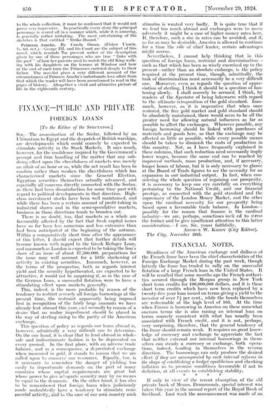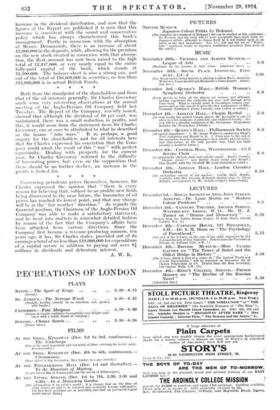FINANCIAL NOTES.
Steadiness of the American exchange and dullness of the French franc have been the chief characteristics of the Foreign Exchange Market during the past week, though latterly the franc has tended to rally on the successful flotation of a large French loan in the United States. It will be recalled that some months ago the French authori- ties secured through the Morgan group in New York short term credits for 100,000,000 dollars, and it is these short term credits which have now been replaced by a twenty-five year loan issued on terms giving a yield to the investor of over 7- per cent., while the bonds themselves are redeemable at the high level of 105. At the time when France is borrowing in America on these somewhat onerous terms she is also raising an internal loan on terms scarcely consistent with what has usually been associated with French credit, and it is not, perhaps, very surprising, therefore, that the general tendency of the franc should remain weak. It requires no great know- ledge of currency and exchange to appreciate the fact that neither external nor internal borrowings in them- selves can steady a currency or exchange, both opera- tions, indeed, tending in themselves in the reverse direction. The borrowings can only produce the desired effect if they are accompanied by such internal reforms in the shape of establishing a budget equilibrium and checking inflation as to promise conditions favourable if not to deflation, at all events to establishing stability.
If only in view of the recent absorption of the old private bank of Messrs. Drummonds, special interest was taken this year in the annual report of the Royal Bank of Scotland: f-.ast week the announcement was, made of an increase in the dividend distribution, and now that the figures of the Report are published it is seen that this increase is consistent with the sound and conservative policy which has always characterized this bank's management. Partly in connexion with the absorption of Messrs. Drummonds, there is an increase of about £2,000,000 in the deposits, while, allowing for the premium on the new stock created in connexion with that absorp- tion, the Rest account has now been raised to the high total of £2,347,000, or very nearly equal to the entire fully-paid capital of the bank, which stands at £2,500,000. The balance-sheet is also a strong one, and out of the total of £16,600,000 in securities, no less than £15,080,000 is in actual British Funds.
* * * *
Both from the standpoint of the shareholders and from that of the oil interests generally, Sir Charles Greenway made some very interesting observations at the annual meeting of the Anglo-Persian Oil Company held last Tuesday. The Report of the Company, recently issued, showed-that although the 'dividend of 10 per cent. was maintained, there was a small reduction in profits, and this, it would seem from the statement from- Sir Charles Greenway, can at once be attributed to what he described as the insane " rate wars." It is, perhaps, a good. augury for the shareholders and for oil interests here that Sir Charles expressed his conviction that the Com- pany could await the result of this " war " with perfect equanimity. Dealing with prospects for the current year, Sir Charles Greenway referred to the difficulty of forecasting prices, but even on the supposition that there should be no further decline, an increase in the profits is looked for.
* * * Concerning petroleum prices themselves, however, Sir Charles expressed the opinion that " there is every reason for believing that, subject to no prolific new fields being discovered in the near future, the barometer of oil prices has reached its lowest point, and that any change will be in the fair weather' direction." As regards the financial position, the Chairman of the Anglo-Persian Oil Company was able to make a satisfactory statement, and he went into matters in somewhat detailed fashion by reason of the fact that the Company's affairs have been attacked from various directions. Since the Company first became a revenue-producing concern, ten years ago, it has, Sir Charles states, provided out of its earnings a total of no less than £19,000,000 for expenditure of a capital nature in addition to paying out over 91- millions in dividends and debenture interest.
A. W. K.



























































 Previous page
Previous page